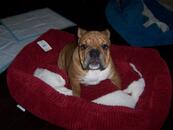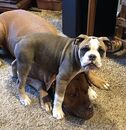Some background:
Goob-3.5 years old
Grain Free, Merrick Texas Beef
No food allergy up to date
No skin issues
No health issues
No food switches
No new treats
No new cleaning products
No walks on chemically treated lawns
I am just wondering how to spot the beginning signs of a food allergy...or any allergy. Goob has been licking his paws somewhat regularly for the last week or so. His front paws have been getting pretty pink but have not yet become yeasty (his back paws are completely normal and no licking). I am cleaning them daily and every time he even STARTS to lick, I make him stop. I don't know if he's licking because he is itchy or if it's just a habit while chewing his bone? Is it possible that he has developed an allergy to his food? He isn't scratching and his skin is clear. I'm just confused as to why he's started licking his feet more than usual.
Any thoughts?
Goob-3.5 years old
Grain Free, Merrick Texas Beef
No food allergy up to date
No skin issues
No health issues
No food switches
No new treats
No new cleaning products
No walks on chemically treated lawns
I am just wondering how to spot the beginning signs of a food allergy...or any allergy. Goob has been licking his paws somewhat regularly for the last week or so. His front paws have been getting pretty pink but have not yet become yeasty (his back paws are completely normal and no licking). I am cleaning them daily and every time he even STARTS to lick, I make him stop. I don't know if he's licking because he is itchy or if it's just a habit while chewing his bone? Is it possible that he has developed an allergy to his food? He isn't scratching and his skin is clear. I'm just confused as to why he's started licking his feet more than usual.
Any thoughts?
 :D
:D .
.




